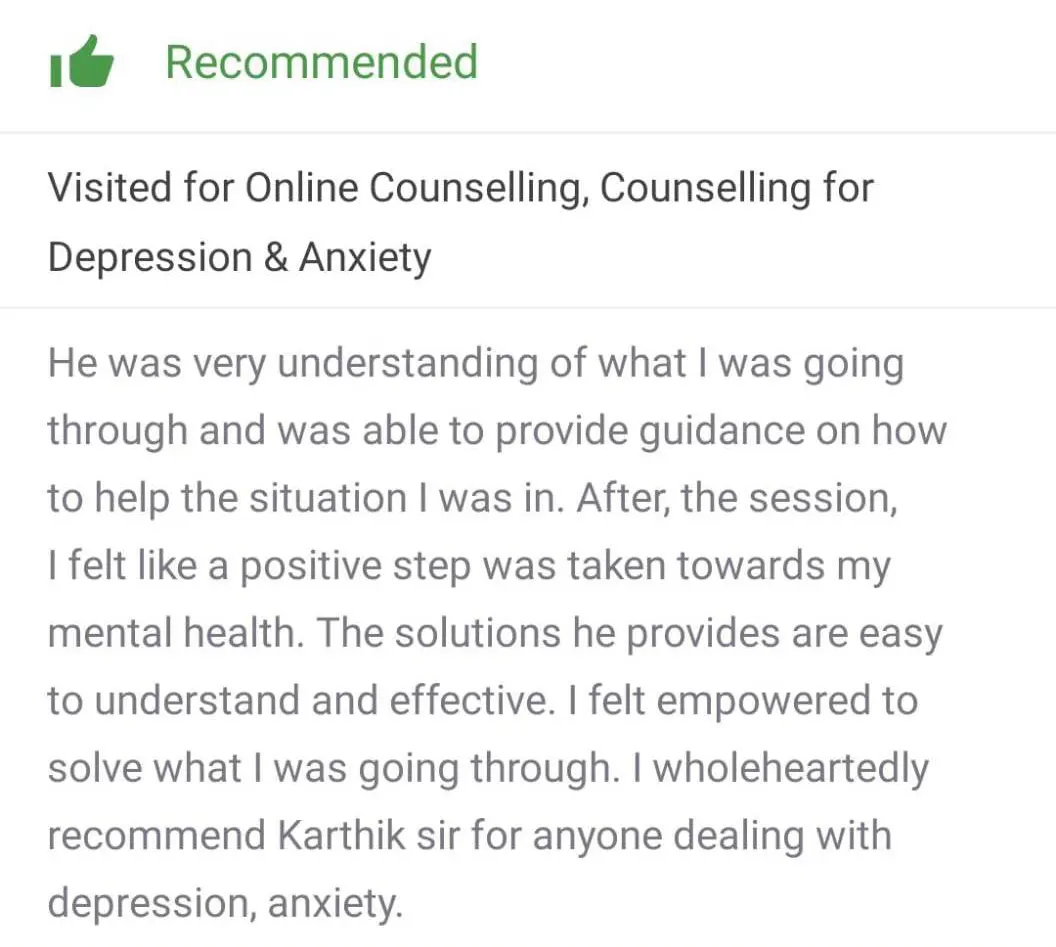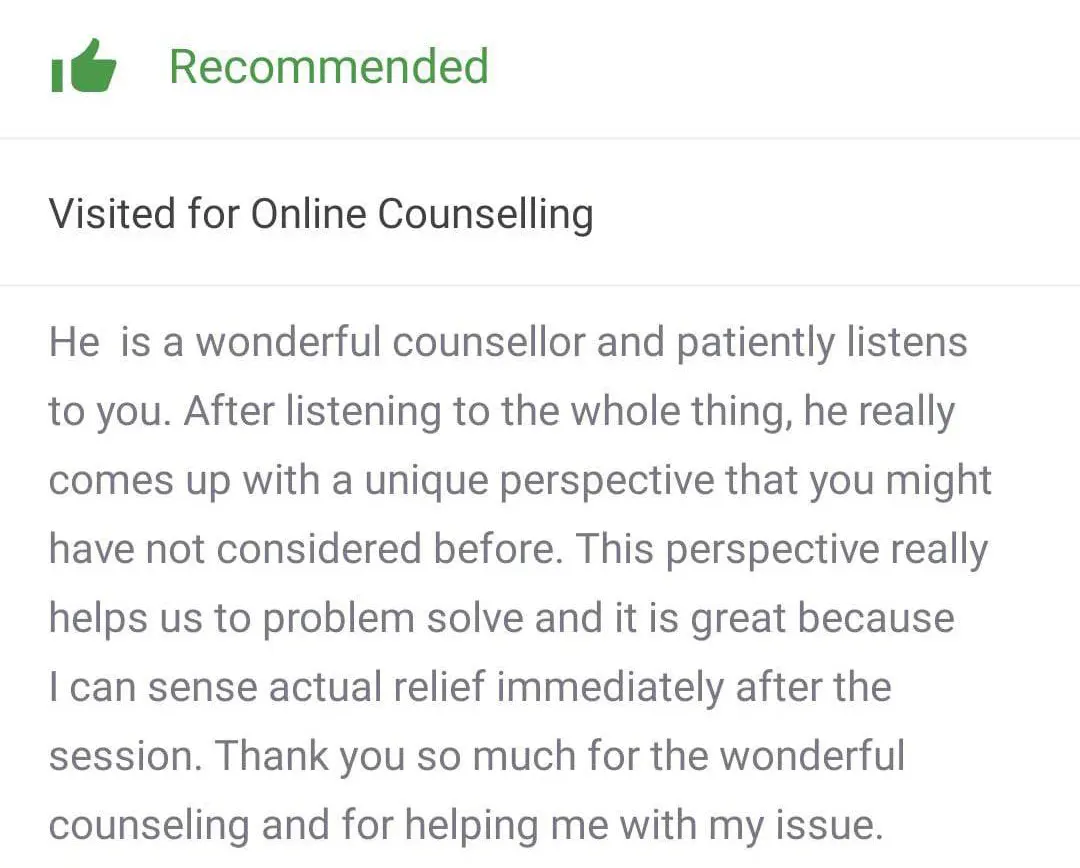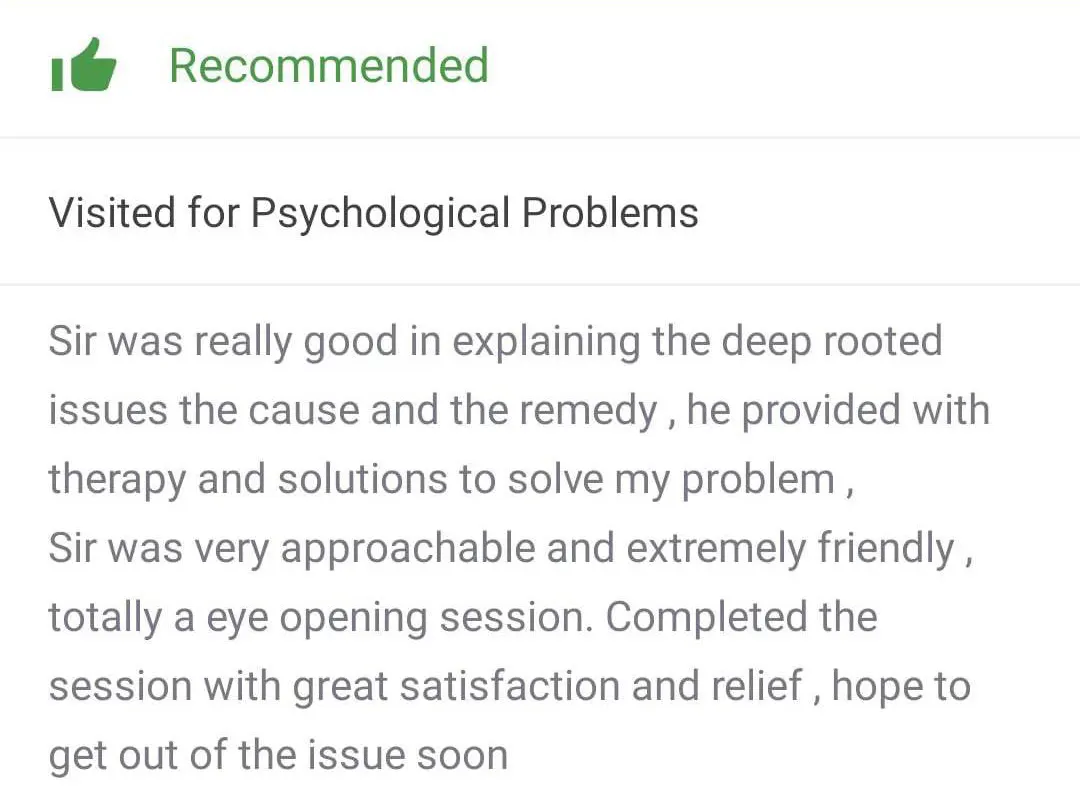Bullying/Ragging/School Refusal Counselling
Say goodbye to bullying, ragging, and school refusal with our expert counselling services!

Our compassionate counsellors will work with you to address the root causes of bullying/ ragging and school refusal issues and develop strategies to overcome them. With a safe and supportive environment, you’ll be able to work through your challenges and regain confidence in yourself and your abilities. Don’t let negative experiences hold you back, take control of your future with our Bullying/Ragging/School Refusal Counselling today!
Mode of Counselling: Both In-Person/Online Counselling
Need Counseling?
Bullying/Ragging/School Refusal Counselling for Psychological Issues
Ragging and bullying – Both involve acts of aggression that can be verbal/mental abuse such as e.g. insulting, name-calling, cyberbullying or physical abuse. Ragging is a one-time ritual to initiate new members into a social group whereas bullying excludes the victim from a social group. Raggers believe that ragging strengthens the social bonds between members, which makes victims perceive ragging as an inevitable practice that they must go through. Bullies, often, are older, stronger, or belong to a higher social status; this is the reason that they do not see their victims as peers and harass/harm them.
Know Someone who has been Ragged/Bullied?
Ragging/bullying is a serious problem among school-age children and adolescents attending college. It can have harmful short- as well as long-term effects not just on the one who is bullied, but also on the one who bullies as well as the bystander present during the incident.
Helping kids deal with/prevent bullies
Here are some tips to follow in case of mild incidents:
- Need to be alert: Often it is found that victims suffer in silence. When paid attention to, behavioural changes in the victim like e.g. becoming more withdrawn, changes in eating/sleeping habits, avoiding school or other social events, etc. might expose ragging/bullying. Physical signs such as the victim’s belongings getting lost, injuries etc. might also be some indications.
- Talk: Trying to talk to the victim, giving emotional support, etc. can aid the victim’s healing, and eventually the victim may open up about the situation he/she is facing.
- Never encourage fighting back: Fighting back often poses a greater danger to the victim via encouraging violence and the underlying problem is left unsolved. Instead, encouraging passivity might prove to be a better option. The reason is that aggressors just await a response from their victims and so choosing not to respond may be a wiser as well as the safer choice. Alternatively, the victim might respond assertively i.e. directly and clearly, in a respectful manner so as to minimise conflict.
Therapy for the Bullied
Unless directly experienced, one may not realize the overwhelming effects of bullying, especially when considering a child or teenager. Being a victim of bullying can make you feel angry, helpless, and isolated. The victim can even feel ashamed and guilty as if it was their fault. Professional therapy can help victims of bullying share and overcome painful feelings, which otherwise can negatively impact their well-being. Sometimes, victims of bullying may in turn become bullies, in order to avenge personal insults, which can cause challenges in one’s relationships and one’s sense of self.

A trained therapist can help a person better understand how this role of victim impacts their lives, as well as teach coping skills for moving forward, such as assertive communication and boundary-setting. Some victims of bullying benefit from support groups or group therapy, in which people who have experienced similar types of victimization can support one another in healing. Children who are victims of bullying in school may find it helpful to talk to their school counsellor. The school counsellor may be able to act as an advocate for them at school, check on their mental well-being, and boost their self-esteem.
Counselling for the Bully
The thing is, even the bullies themselves may be the unsuspecting “victims” of the circumstance. Not many people are born heinous. They may have developed such behaviour after experiencing it themselves, and are turning that aggression and anger towards others. It is only when they recognise what they are doing, why they are doing it, and how it impacts their victims, will they be able to address their inner demons. Chennai Counseling Services have professional counsellors that are skilled in tackling such problems, helping both the bully and the bullied to develop better ways to cope.
Need Counseling?
Popular Questions
We have answers to common questions people ask
Counseling is NOT advice/suggestion but helping people to help themselves. It is not telling what is right or wrong. It is NOT giving opinions or 3rd Person’s Point of View. Counselling will help you to improve your emotional/mental health by working on your thoughts/beliefs, feelings, needs and behavior. On the contrary, advice and suggestions will make the people dependent on the person who is offering them. Counseling will make people self-dependent and empowers you to problem solve and make decisions on your own. Counselling will also help you to prevent problems and also develop yourself as a better person.
- Press “Book a Slot & Pay” Button
- Choose the mode of counselling whether in-person or online.
- Choose the counselor or press any counselor
- The calender will open. Please see the available dates in green color. (Brown colored dates indicates slots are NOT available on those days)
- Click on the date you want the slot. It will show the available slots beneath in Green Color.
- Choose the slot you want and Press Next Step Button.
- Give the details of the client. Press Next Step Button.
- Choose any one of the Payment Gateways and make the payment of INR 1600/-:
- Razorpay (UPI/Gpay, Card & Netbanking) Press Submit Button and pay via the pop-up
- Stripe (Visa, Master, Mastro & Amex Card) Give the card details and Press Submit Button.
- After the successful payment, Appointment confirmation screen will appear. Please take a screenshot of that for your immediate reference. You will also get an email from us. If not found on inbox, please check spam and promtions.
We understand there are some fake organizations you might have come across and so getting doubtful about us is normal. The counselor himself maintains the data in the website. It is accurate. You may take screenshots and we assure you that we won’t change our words later.
If we try hard to make people trust us, some become more doubtful. We can’t help it. So we just request to consider the following to confirm our credibility. If you can’t trust us, better do not book appointment with doubts about our credibility. It is not possible to convince you to trust us.
- Verify our Govt. of India Registration Number: You can check our registration Number in https://udyamregistration.gov.in/Udyam_Verify.aspx Our Registration number with Ministry of Small & Medium Scale Enterprises, Govt. of India is UDYAM-TN-02-0007295 Please copy paste the the registration number and do not try to type as you may miss some characters.
- Verify GSTIN: You may visit https://services.gst.gov.in/services/searchtp and provide our GSTIN: 33AMLPR6303E1Z7. Please copy paste the GSTIN and do not try to type as you may miss some characters. Mobile version of the GST website is not working often. So kindly use laptop/PC to check. You can see our GST Registration certificate in our About Us Page https://counselingchennai.com/our-founder/
- Google Page: Go to www.maps.google.com or Open Google Maps app in your mobile phone and search for “Chennai Counseling Services/CCS Academy”. Regularly we update posts, photos and get new reviews. 700+ reviews are there (If you think all are fake/paid reviews, we can’t help it.)
- Payment Gateways: Payment part is fully taken care by Razorpay Payment Gateway and Stripe Payment Gateway. These are trustworthy gateways. Your payment data is processed in their websites. In case of any issues in the payment, you can contact their 24/7 customer care also.
If you are worried about giving your card details in gateways, please use NetBanking via Razorpay Payment Gateway, you will not give any bank related details in the website of the Gateway. You will just choose the bank under NetBanking and go to your bank website only. Please check whether your bank website is secure with “https” in the URL, check for the spelling of your bank in the address bar and see whether it looks the same way it was before and make the payment. - SSL Secured Website: Moreover ours is a secure website with “https”. You can click on the lock symbol of the address bar and check the full details of our SSL Certificate which proves that the data you give in this site is encrypted and secure.
Our counsellors want to understand the client’s emotions through the facial expressions, gestures and tone. So that we can help the client more effectively. In case of chat counselling, Phone/Audio Only counselling, these ques will be missing and the counselling will not be effective.
In the past some clients have booked appointment and never showed up for the session. So those slots went waste. Those slots could have been given to the people who required it. When we started collecting the full fee in advance and adopted no refund and no rescheduling policy, the no shows have become almost nil. We want people to commit to the appointment time taken.
Yes. If the client has any diagnosed psychological disorder and is under regular medication already, we will be able to treat.
It is based on various factors such as severity and onset of the issue, support system available, client’s motivation and engagement. When we assessed all of them and give an approximate number of sessions required in the past, some clients took it like we unnecessarily ask them to come for many sessions. So we stopped giving idea on the number of sessions required and we leave it to the discretion of the client. Client may choose to book appointment when he/she wants a session.
We never tell the clients to book many slots in advance. During the counseling sessions, we may discuss whether the next session is required or not and client can choose to book or leave it.
The clients will anyway pay for only one session every time. In the first session, you can evaluate whether counselling can help you and decide to book for further sessions or not. When you book for the next session, please make sure that you have an agenda for the session.
The client would bring the agenda for the session and counsellor will help to get a direction by working on your thoughts, emotions and behaviours. The agenda may be to resolve a problem or to prevent future problem(s) or to develop oneself.
If there is no diagnosis of any severe psychological disorder, counselling will surely help you. If you have been diagnosed to have disorders such as Schizophrenia/Bi-Polar Disorder/Personality Disorder by a clinical psychologist, Counselling will help with regular medication.
Counselor will first meet the client individually and spend more time. Family members/parent will be met later for a brief period of time. It will not be possible to update you about the things happened in the session owing to confidentiality. Our counsellor will try his best to empower your family member/child to communicate the things happened in the session to you directly.
Of course, well-wishers are very important people in our lives. Though talking to them may resolve some issues, there are many limitations. In the busy life of the present, friends and family have their own problems and may not be listening very carefully and unintentionally end up giving advices that may actually prove more harmful than helpful. They may not be able to look at you objectively. They can be biased unconsciously because they have preconceived notions about you. There is a possibility that they can influence you with their personal values and judgments. When issues are complex, they may become anxious and transfer their anxiety to you, whereas a professional assesses you based on scientific knowledge and thus the bias is very minimum and objectivity is very high. A professional will be able to help even if the issue is complex because he is well trained to understand people and possess the skills and qualities to help!
Counsellors help in learning new/different ways of thinking, feeling and behaving to resolve conflicts/problems/losses in everyday life.
Counseling is always voluntary. People should not be forced to go for counseling. Counsellors have respect for Privacy and Autonomy. Counselor will not give their personal opinions in right-wrong paradigm. He may guide the clients on the scientific facts. He will not influence the client by personal values and judgments. He maintains strict Confidentiality. He does not reveal the identities and things discussed in counseling to any other. The Counsellor has developmental and cultural sensitivity and act to avoid harming his clients. The relationship between Counselor and Client will be a professional relationship alone. He does not condone or engage in discrimination based on age, gender, culture, disability, ethnicity, sexual orientation, caste and religion. When he feels that he is not able to help the clients and lack in competence, he will refer the clients to competent professionals. Please see the Our Ethics Page for more details.
The individuals who accept that their own efforts have not helped and seek counseling voluntarily benefit the most! Please remember that counseling is NOT advice giving. Counseling help is not a “quick-fix” solution. It is an interpersonal process between the client and a trained mental health professional. Commitment on the part of the client and their families along with counseling professional bring greater results.
Both professionals often deal with similar mental health problems; however the focus of treatment tends to be different. Psychiatrists are medical doctors with M.D. in Psychiatry or Diploma in Psychological Medicine (DPM) and are recognized to prescribe medicines, specializing in the treatment of mental disorders.
A professional counselor is a psychologist who has the ability to define problems and identify the barriers that prevent them from thinking clearly. The counselor throws light on those barriers and works with the individual’s mental health by working on the thoughts, emotions and behaviours to develop proactive and objective solutions to problems. Psychiatrists and professional counselors may team up together in treatment process for better results for various psychological issues such as addictions, depression and anxiety that require medications.
In psychological counseling, it is generally considered better to meet the client first rather than informants. The primary reason for this is that the client is the direct recipient of the counseling and their perspective and experiences are crucial for understanding their mental health and well-being. By meeting the client first, the counselor can establish a therapeutic relationship with them, which is essential for effective counseling. This relationship helps build trust, empathy, and rapport between the client and the counselor, creating a safe space for open communication and exploration of their concerns.
While informants such as family members, friends, or teachers can provide valuable insights into the client’s life and behavior, their perspectives may be subjective or incomplete. Meeting the client directly allows the counselor to gather information firsthand and gain a comprehensive understanding of their unique circumstances. It also enables the counselor to assess the client’s mental health needs accurately and tailor the counseling approach accordingly.
Here are some of the potential concerns:
1. Lack of client perspective: Meeting the informant first may result in a limited understanding of the client’s experiences, emotions, and concerns. The counselor may form initial impressions or make assumptions based solely on the informant’s account, which can be subjective or incomplete.
2. Loss of client trust: If the client discovers that the counselor has met with an informant before meeting them, it may raise questions about confidentiality and trust. The client might feel that their privacy has been compromised or that their perspective has been misrepresented.
3. Inaccurate assessment: Without direct interaction with the client, the counselor may struggle to accurately assess their mental health needs, symptoms, or goals. The counselor’s understanding of the client’s situation may be based on second-hand information, potentially leading to misinterpretations or misdiagnoses.
4. Limited therapeutic relationship: Establishing a strong therapeutic relationship is crucial for effective counseling. By meeting the informant first, the counselor may miss an opportunity to build rapport, trust, and empathy directly with the client. This can hinder the therapeutic process and impact the overall effectiveness of counseling.
5. Ethical considerations: Meeting informants before clients raises ethical considerations related to confidentiality, informed consent, and professional boundaries. It is essential for counselors to prioritize the well-being and autonomy of their clients while adhering to ethical guidelines and legal requirements.
Counseling is always voluntary because it is a process that is based on the relationship between the counselor and the client. The client needs to be able to trust and feel comfortable with the counselor in order to be open and honest about their thoughts, feelings, and experiences. This is essential for the counseling process to be effective.
If counseling is not voluntary, the client is less likely to be engaged and to participate fully in the process. This can make it difficult for the counselor to help the client achieve their goals. Additionally, forced counseling can be harmful and can actually make the client’s problems worse.
The client must be initially motivated to attend at least their first appointment and maintain their drive to avoid dropping out. Collaborative engagement encourages the therapeutic alliance and improves treatment outcomes.
Need Counseling?


